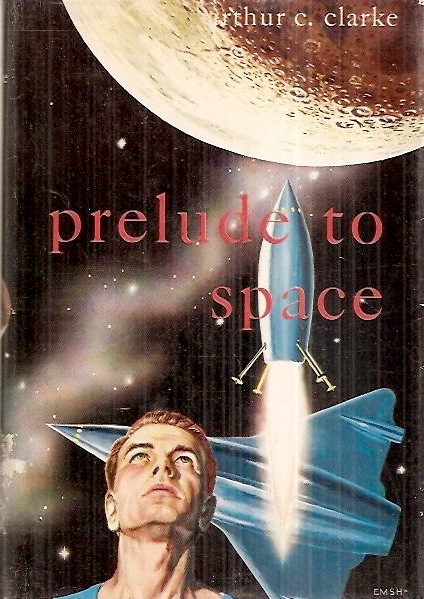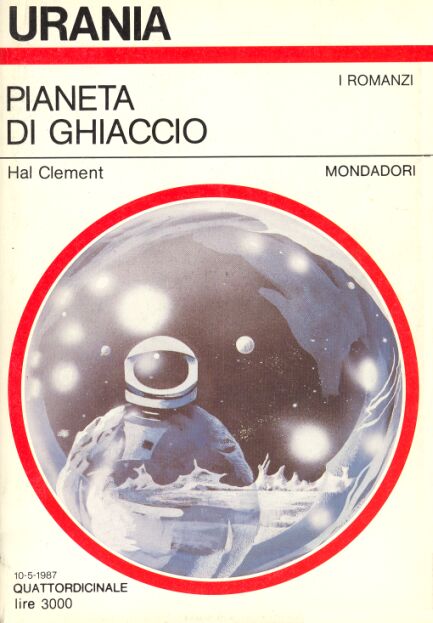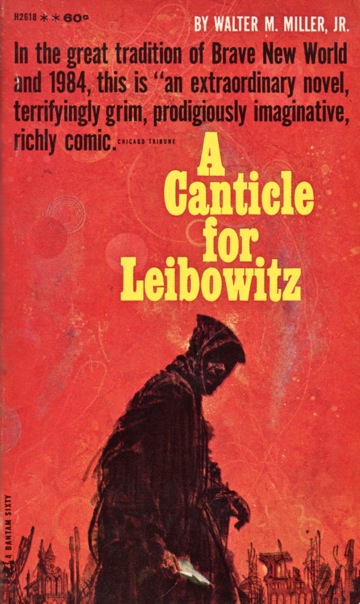By John Hertz: We’ll take up three Classics of Science Fiction at Loscon XLV, one discussion each. Come to as many as you like. You’ll be welcome to join in.
We’re still with “A classic is a work that survives its own time. After the currents which might have sustained it have changed, it remains, and is seen to be worthwhile for itself.” If you have a better definition, bring it.
Each of our three is famous in a different way. Each may be more interesting now than when first published. Have you read them? Have you re-read them?
Arthur C. Clarke, Prelude to Space (1951)
 Halfway between the end of World War II and the rise of Sputnik – I warned you about these puns – is this fine instance of giving the touch of reality to what had never yet been, as SF hopes to achieve. Today, knowing many things happened otherwise, we can watch the author at work.
Halfway between the end of World War II and the rise of Sputnik – I warned you about these puns – is this fine instance of giving the touch of reality to what had never yet been, as SF hopes to achieve. Today, knowing many things happened otherwise, we can watch the author at work.
Hal Clement, Iceworld (1953)
 Interstellar traders return to a world where they’ve been operating with great difficulty. Its inhuman cold hinders everything. It seems to have intelligent life, but how could that be? The world is so cold it freezes zinc – yes, Earth: the protagonists’ world is hundreds of degrees hotter.
Interstellar traders return to a world where they’ve been operating with great difficulty. Its inhuman cold hinders everything. It seems to have intelligent life, but how could that be? The world is so cold it freezes zinc – yes, Earth: the protagonists’ world is hundreds of degrees hotter.
Walter M. Miller, Jr., A Canticle for Leibowitz (1959)
 An extraordinary novel, terrifyingly grim, prodigiously imaginative, richly comic – well, that’s true. Also we’re not long on stories that well paint any mainstream religion. Here the Catholic Church is at center stage, the light relentless, but not ruthless, on Catholics and everyone else.
An extraordinary novel, terrifyingly grim, prodigiously imaginative, richly comic – well, that’s true. Also we’re not long on stories that well paint any mainstream religion. Here the Catholic Church is at center stage, the light relentless, but not ruthless, on Catholics and everyone else.
Discover more from File 770
Subscribe to get the latest posts sent to your email.

I found a download of Prelude to Space at one of the online libraries a few months ago. It was the first time I’d read it since I was a pre-teen. It’s obviously dated but still a pretty good read.
Iceworld is the first Clement I ever read. (In fact, it’s one of the first books I bought, back when I was a high-school student on a pretty modest budget.) I loved it then, and I raised it at a panel on science-in-SF some years ago because it’s a beautiful inversion of Campbell’s let’s-all-go-to-another-world-and-point-at-the-strangeness — it shows that Earth would be just as strange to visiting aliens. But I thumbed through a copy some time ago and was struck by the way it was stuck in the 1950’s; I can’t claim the Suck Fairy had at it because it was supposed to be set when it was written (1951) rather than in our future and was probably reflecting its times, but I’d completely forgotten the hard gender-role assumptions in the first few pages.
John Hertz replies by carrier pigeon:
I respectfully question this “dated” business, “stuck in the 1950s”, and like that.
Is Shakespeare “dated”? The Tale of Genji? The Book of Esther? The Buddha?
Speaking for myself, I sometimes look in the mirror and say “If you didn’t worship idols, you wouldn’t be shocked to find they have feet of clay.”
Not long ago Mark Blackman said here – I can’t do quasi-quotation marks, they tear this thin paper – “Of course it seems laughable now. Isn’t that a gratifying sign of progress since then?”
All of those stories are period pieces. We tend to think of SF as being a literature of the future; people I listen to have varying degrees of patience with the assumption of much older SF that the tech will advance miraculously but the social structure will be unchanged. This is not universally a factor; Sturgeon, for instance, set ~most of his work in the time when it was written rather than the future, and there are times when readers make allowances for the gender divisions this causes and times when those divisions are impossibly grating. This particular Clement work, when I reread it, seemed to me to hit very hard on assumptions of different rules and behaviors for different genders — more so, and sooner, than any Sturgeon I can recall — and so I called it dated — and then acknowledged that a work set almost 70 years ago is not going to work by the same assumptions many of us would like to see today even if it is SF.
I also find John’s comparisons … overheated. Clement was a good workmanlike writer, no more; I doubt he will be read nearly as long as any of the examples raised. I personally try not to worship idols, as it’s a chancy business. And I’m not sure what the difference is between “dated” and “laughable”; ISTM that neither is characteristic of a classic as John defines it.
John Hertz replies by carrier pigeon:
Triangles (to pick one example) of the same shape are similar even if very different in size.
“Clement was a good workmanlike writer, no more” would have better omitted its last two words.
Sturgeon attacked “social structure” he found “impossibly grating” – with or without (1) poetry, (2) merit, (3) assumptions of his own. Clement had other fish to fry.
“not going to work by the same assumptions many of us would like to see today even if it is SF” – here, I respectfully suggest, old friend, is the point; and, I respectfully suggest, for the moment it is a distraction.
Two and a quarter centuries ago, Johnson (!) said “Those who have no power to judge of past times but by their own, should always doubt their conclusions” (Lives of the English Poets; Milton).
I don’t see how something can be both a point and a distraction.
Part of whether something can last (and hence be called a classic, by John’s definition) is whether it is still readable. It is possible that Iceworld still passes this test for many people — but I suspect others would be so unfavorably struck by the attitude I describe (despite my comment that the book subsequently breaks another stereotype of the time) as to find it unreadable.
John Hertz replies by carrier pigeon:
Something can be both a point and a distraction if it points away (one meaning of point); or if it pulls away (another meaning).
That’s how it’s possible to say misguided or following Will o’ the Wisp.
Sooner or later, I believe, we each have to decide for ourselves.
I don’t think Iceworld is a classic because it breaks a stereotype.
I don’t think Iceworld is no classic because it doesn’t break a stereotype.
My definition says After the currents which might have sustained it have changed, it remains, and is seen to be worthwhile for itself.
I believe “the hard gender-role assumptions” have changed. Not enough, in my opinion, but, I respectfully suggest, that point is, for the moment, a distraction.
In these discussions we consider whether X is a classic, and why or why not. When I conduct the discussion, the people present are entitled to hear what I think. I hope to hear what they think.
“I suspect others would be so unfavorably struck by the attitude I describe (despite my comment that the book subsequently breaks another stereotype of the time) as to find it unreadable.”
This statement is so of its time. I wonder if anyone will find it readable in fifty years?
I’m not trying to create a classic myself, just questioning. I don’t expect people to be reading my statement five years from now, let alone fifty (even though we’re warned that nothing that’s ever on the interwebs can be expected to disappear). In fifty years, people may brush off the sexism but be appalled that somebody would use casually use cigarettes as a trade good — or they may dismiss the entire book as an early, primitive stage.
John Hertz replies by carrier pigeon:
Wups! There’s one word you really should have omitted, you spoiler you.
Speaking of particular words, I was wondering when “dismiss” would appear.
Chip, I find your language – overheated.
I’m not trying to create a classic. Or to brush off anything – including these remarks of yours. Or to use casually what’s appalling.
I invite considering whether an artwork of another time can have merit today. This may call for weighing its assumptions against – what? That, I suggest, is a worthwhile question.
Also I invite considering how an artwork achieves – not just its so-called contents.